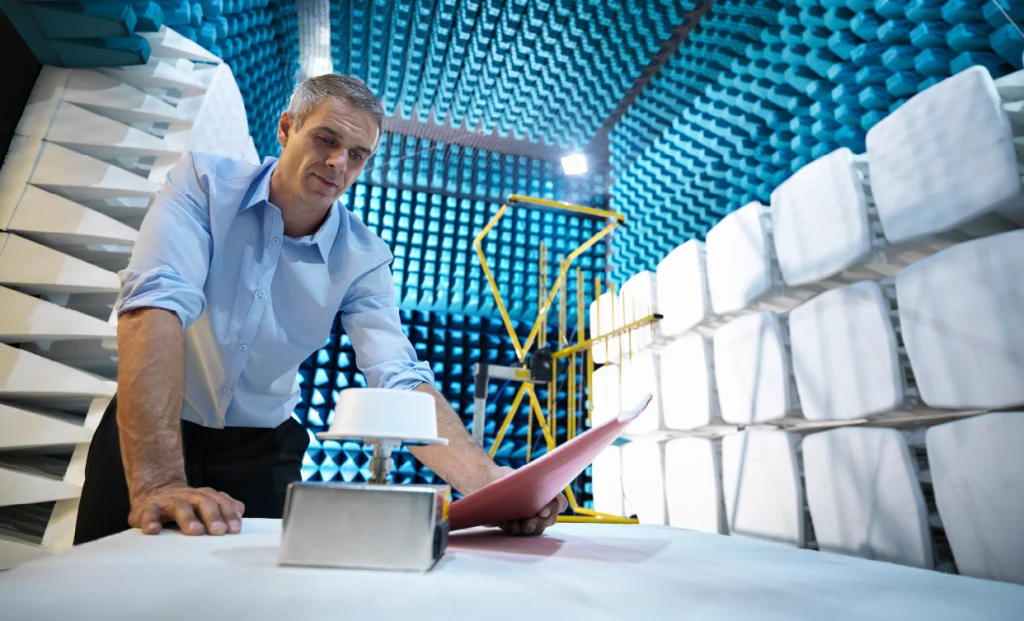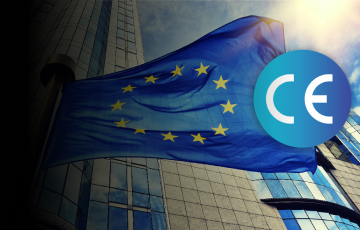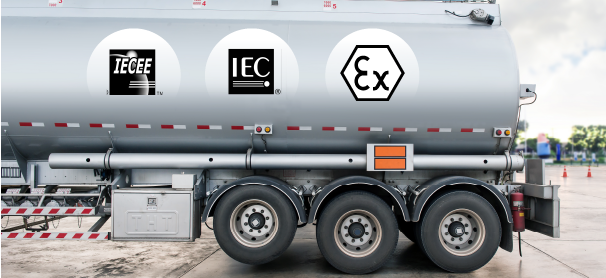Are you ensuring your electronic products are compliant with global EMC standards? EMC Testing is crucial for verifying that your devices meet the necessary electromagnetic compatibility requirements, which prevent them from emitting or being affected by unwanted electrical interference. At 360Compliance, we specialise in EMC testing, providing comprehensive services that ensure your products adhere to international regulations and maintain functional integrity in their operational environments. Whether you’re dealing with consumer electronics, automotive components, or industrial machinery, our expertise in EMC standards helps streamline your path to market compliance and enhances product reliability.
What is EMC Testing?
EMC refers to Electro Magnetic Compatibility and Electro Magnetic Interference between Electrical products and the implication on the end user in terms of Emission on the user and Immunity from hazardous. Therefore, EMC testing & certification are mandatory requirements worldwide and essential in product design.
EMC compliance testing is important to getting your electronic product ready for market. Industry veterans understand that electronic devices can be plagued by signal interference and equipment emissions. That’s why electromagnetic compatibility (EMC) is mandatory worldwide before launching a product. At 360 Compliance, we handle every single aspect of your EMC testing.
EMC Market Access Requirements

- USA: FCC Part15 Testing & Certification
- Europe: EMC testing for CE Mark (EMC Directive 2014/30/EU)
- Canada: EMC testing according to Industry Canada
- Japan: VCCI EMC testing & Certification
- S. Korea: KCC EMC testing & Certification
- Australia: ACMA Registration
- Brazil: Anatel testing & certification
- China: CCC Testing & Certification Technical Assessment
What are the Different Types of EMC Testing?
There are two main types of EMC testing:
- Emissions Testing: This phase measures the electromagnetic radiation emitted by a device. Uncontrolled emissions can interfere with other nearby electronic equipment or even compromise the device’s own performance. Emissions testing ensures that devices operate within specified limits to prevent such interference.
- Susceptibility Testing: Also known as immunity testing, this assesses how well a device can withstand external electromagnetic interference (EMI) without malfunctioning. Devices are subjected to various electromagnetic fields to determine their resilience in real-world scenarios.
The EMC Testing Procedure
The specific procedure can vary depending on the device and the applicable standards, but here’s a general overview:
1. Pre-testing preparation:
- Identify applicable standards: Different regulations exist for various devices and markets (e.g., FCC in the US, CE in Europe).
- Develop a test plan: This outlines the specific tests to be conducted and the equipment needed.
- Prepare the Device Under Test (DUT): This could involve setting up the device in its intended operating configuration with cables, antennas, and peripherals.
2. Emissions testing:
- Measure the electromagnetic waves emitted by the DUT using specialized antennas and receivers in an anechoic chamber (a shielded room that absorbs reflections).
- Compare the measured emissions to the limits specified in the relevant standards. If the emissions exceed the limits, the device fails the test.
3. Immunity testing:
- Expose the DUT to various electromagnetic fields, simulating real-world scenarios like electrostatic discharges, power surges, and radio frequency interference.
- Observe the DUT’s performance under these conditions. If the device malfunctions or exhibits unexpected behavior, it fails the test.
4. Reporting and certification:
- Test report: Compile a detailed report documenting the testing procedures, results, and conclusions.
- Certification: If the DUT passes all tests, it can be certified as compliant with the relevant standards.
What Types Of Products Need EMC Certification?
Any electronic device can benefit from EMC testing, but certain categories require it due to their potential impact on other electronics or their own susceptibility to interference. Here are some key examples, along with the relevant standards they should comply with:
Consumer Electronics:
- Televisions: Can emit strong radio frequencies that interfere with other devices like radio receivers. Standard: CISPR 32
- Smartphones and tablets: Wireless communication and internal circuitry can both emit and be sensitive to interference. Standard: FCC Part 15
- Bluetooth speakers and headphones: Continuous data transmission can lead to EMI issues if not properly designed. Standard: EN 55032
- Home appliances: Microwave ovens, washing machines, and refrigerators can generate electromagnetic noise, affecting other devices. Standards: EN 55014
Additionally, EN 55032 is a specific product standard covering EMC compliance testing of Multimedia Equipment (MME) and replaces several other product standards, including EN 55022 for ITE. You can find more detailed guidance on EN 55032 here.
Industrial Equipment:
- Motors and drives: High currents and switching frequencies can create conducted and radiated EMI, disrupting control systems and communication in factories. Standards: EN 61800-3, IEC 60034-5
- Robots and automated machines: Wireless communication and control signals can be susceptible to interference, impacting operation and safety. Standards: EN 55011, IEC 61000-6-4
- Medical devices: Ensuring their proper functioning despite potential EMI from other equipment is crucial for patient safety. Standard: IEC 60601-1-2
Other Products:
- Automotive electronics: From GPS systems to engine control units, car electronics need to be EMI-resistant and not interfere with other vehicles or roadside infrastructure.
- Wireless access points and routers: These devices constantly transmit and receive data, so compatibility with other Wi-Fi signals is essential.
- Some toys and hobby equipment: Depending on their functionality and emissions, specific types of toys and hobby products might also require EMC testing.
Why Choose 360Compliance For EMC Testing?
EMC Certification of electrical equipment is a complex process that requires knowledge of the laws of different countries, regulations, and standards for electromagnetic compatibility. The slightest mistake in the documentation can lead to the fact that you have to start the whole process again. This can lead to additional time and material costs.
At 360Compliance, we specialize in international certification services. Our team of qualified experts is dedicated to facilitating swift EMC testing for your products. Leveraging our extensive experience, we guide you through the process, ensuring prompt resolution of regulatory compliance issues and securing the necessary certificates for market access. Our comprehensive services cover testing for a broad spectrum of electrical and electronic products.
If you have questions about EMC testing, please contact 360Compliance. Our experts are ready to provide you with all the information you need.
Other Certifications

Regulatory Radio Testing
Which Products Require Radio Testing? Radio testing is a crucial step in the development and manufacturing of any product that utilizes wireless technology. This testing ensures that the product complies with regulatory requirements and operates safely and effectively within the designated radio frequency spectrum. Products that require radio testing typically include those that use the following technologies: Wi-Fi (WLAN): Products like Wi-Fi routers, access points, and Wi-Fi-enabled devices such as smartphones, laptops, and tablets. Bluetooth®: Wireless headphones, speakers, keyboards, mice, and fitness trackers. Radar: Used in various applications, including automotive safety systems, weather forecasting, and air traffic control. Ultra-Wideband (UWB): Emerging technology used in high-speed data transfer applications. RFID: Used in tracking and identification systems, such as contactless payment cards and asset tracking tags. 5G: The latest generation of cellular network technology. Short Range Devices (SRD): Devices with low power consumption and limited range, such as garage door openers and wireless toys. Satellite Earth Stations (Fixed / Mobile): Used for communication with satellites. Telemetry / Telecommand TTE: Used for remotely controlling and monitoring equipment. Ultra Wideband Radios: Used for high-speed data transfer and imaging. Cellular phones that operate under in NB-IoT LTE, 4G, 3G, 2G / GSM bands. Our Regulatory Radio Testing Services: At 360Compliance, we recognize the significance of regulatory compliance and understand the complexities involved. Our comprehensive Regulatory Radio Testing services are tailored to simplify the process and instill confidence in your product's compliance. Here's how we can assist you: Consultation and Assessment: Our experienced team collaborates closely with you to assess your specific needs, ensuring a comprehensive understanding of your product and its intended use. We provide expert guidance on the regulatory requirements applicable to your device. Thorough Testing: Employing cutting-edge testing equipment and methodologies, we execute precise RF testing. Our process guarantees that your devices meet the required specifications and deliver optimal performance. Regulatory Compliance: We guide you through the intricate realm of RF regulations, making certain that your devices align with frequency allocation, emission limits, and other standards mandated by regulatory bodies. Customized Solutions: Our services cater to a diverse array of RF devices and industries, including telecommunications, IoT, automotive, and more. The Benefits of Choosing 360Compliance: Expertise: Our team consists of industry experts with an in-depth understanding of RF regulations and testing methodologies. Efficiency: We streamline the certification process, saving you valuable time and resources while upholding the highest quality standards. Market Access: Our certification ensures that your products can be legally marketed and sold, minimizing potential regulatory challenges. Ready to ensure the compliance and success of your RF devices? Reach out to us today to discuss your specific needs, and let our experts guide you through the Regulatory Radio Testing process. Secure the reliability and legal compliance of your products with 360Compliance.
Learn more
5G Testing and Certification
Are you developing innovative products that rely on cutting-edge wireless connectivity? 5G technology is crucial for enabling self-driving cars, the Internet of Things (IoT), VR/AR, and more, offering numerous advantages over 4G, including faster data transfer, higher download speeds, and increased capacity. To fully leverage the revolutionary potential of 5G, ensuring compliance through rigorous testing and certification is essential. 360Compliance provides comprehensive 5G device testing services, ensuring your products meet international, regional, and national standards, facilitating a smooth market entry and contributing to the advancement of technology across various industries. What is 5G? New innovative products and technologies such as self-driving cars, the Internet of Things (IoT), VR/AP, etc. require better wireless connectivity. 5G technology makes them a reality because this generation of mobile communication has many advantages over 4G: More stable connection and transfer of data; The higher download speed that is almost 100 times faster than 4g and reaches several Gbps; Increased capacity for a single bandwidth that ensures the connection of more equipment and devices simultaneously This wireless technology allows you to accelerate automation processes, implement AI in workflows, create intelligent factories, and more. Why is 5G Compliance Testing Essential for Your Business? The impact of the 5th generation mobile network on the economy and communication will be more revolutionary than any previous generation of mobile communications. Although new devices based on this technology already provide tangible benefits, the potential of this communication type will be fully revealed in the next decade. At the same time, their offer on the global market requires testing 5G and certification confirming compliance with the current international, regional, and national regulations. Market Requirements For the 5th generation mobile ecosystem to become a reality, more work needs to be done at the level of governmental agencies. Additional frequency bands are required to ensure uninterrupted network operation. Currently, high-speed broadband access is proposed through the use of mmWave technology. These radio waves include the 24 GHz ‒ 100 GHz spectrum. However, using such technology has some challenges. Proximity to the transmitter tower is necessary as the signal can be easily blocked. 5G Wireless Testing and Certification If you want to provide goods or services in any segment of the economy based on this revolutionary technology, you need to pass 5G testing and certification. Wireless devices must undergo evaluation to ensure their safety and environmental neutrality for the people using them. Obtaining a certificate confirming compliance with international standards will make it easier and hassle-free to transport your products to the global market. To pass 5G tests, you need to evaluate your products according to the following indicators: Radiofrequency (RF) Electromagnetic compatibility (EMC) Specific absorption rate (SAR) Quality of service (QoS), and others Industries The wide opportunities provided by 5G contribute to the introduction of innovations in all spheres of human life. In particular, among the leaders in the use of Fifth-generation wireless products are the following industries: Medicine Automotive Urban planning Enterprises VR/AR Industry Household appliances IoT products, and many others Why Choose 360Compliance for 5G Device Testing? 5G compliance testing requires verification of compliance not only with international but also with national standards. 360Compliance team has extensive experience in certifying wired and wireless radio electronic devices for markets in over 195 countries. In addition, we have all permits and licenses for the full cycle certification — from the acceptance and consideration of applications to the examination and issuance of certificates. We will evaluate your products through our network of laboratories. Therefore, when you turn to us for a 5G test, you get a fast, professional, and comprehensive service that will save you from unnecessary fuss and red tape. As technology enthusiasts, we strive to ease the way to consumers for products that accelerate progress and empower humanity such as 5th generation-enabled devices. Call us to start your journey to the market!
Learn more
ATEX Testing & Certification
Have you ever wondered how safety is ensured in industries prone to explosive hazards, such as oil refineries, chemical plants, and mining operations? How can you ensure your equipment meets safety standards to prevent accidents? That's where ATEX Certification becomes crucial. Explore what ATEX Certification is, understand its vital role in providing safety, and learn how to effectively manage the certification process with 360Compliance by your side, ensuring your operations are compliant and secure. What is ATEX Certification? ATEX certification is a mandatory requirement set by the European Union to ensure the safety of equipment and devices used in environments with potentially explosive atmospheres. This certification confirms that the equipment has undergone rigorous testing and complies with strict safety directives designed to protect workers and minimize risks in hazardous locations. Explosive atmospheres occur when oxygen combines with flammable substances such as gases (e.g., propane), mists, vapors, or combustible dust. When an ignition source like heat, flame, or sparks is present, the risk of explosion is significant. ATEX-certified products are specifically designed to eliminate these risks by preventing the possibility of ignition, making them safe for use in these environments. Moreover, To ensure ongoing compliance, ATEX certification also requires an annual quality audit according to ISO 80079-34 standards. Certified products display the official "Ex" badge, indicating their suitability for use in explosive atmospheres and adherence to European safety regulations. What Products Need ATEX Testing Products intended for use in potentially explosive atmospheres require ATEX certification to ensure their safety. For instance, these atmospheres may contain flammable gases, vapors, mists, or combustible dust. ATEX testing is particularly crucial for equipment used in industries with a risk of explosion. Here are some examples of products that often need ATEX certification: Electrical equipment: Motors, transformers, switchgear, lighting, communication devices, and portable electronics. Mechanical equipment: Pumps, fans, compressors, valves, conveyors, and mixers. Non-electrical equipment: Tools, instruments, safety devices, and personal protective equipment. Process equipment: Reactors, separators, filters, and dryers. Instrumentation and Sensors: Gas detectors, temperature sensors, pressure transmitters. Benefits of ATEX Certification Enhanced Safety: ATEX-certified equipment ensures a higher level of safety, reducing the risk of explosions and protecting personnel and assets. Legal Compliance: Achieving certification demonstrates compliance with stringent safety standards and regulatory requirements. Global Market Access: Certification opens doors to international markets, as many countries recognize ATEX standards for hazardous environments. Operational Efficiency: ATEX-compliant equipment is designed for optimal performance in challenging and potentially hazardous conditions, enhancing overall operational efficiency. How Do I Become ATEX Certified?? Identify Applicable Directive: Determine the relevant ATEX directive (2014/34/EU for equipment) and understand its requirements. Risk Assessment: Conduct a thorough risk assessment to identify explosive atmospheres and potential ignition sources. Equipment Classification: Classify equipment based on ATEX categories and zones to ensure proper usage in specific environments. Documentation: Prepare technical documentation demonstrating compliance with ATEX requirements. Testing and Assessment: Engage a certified body to perform tests and assessments, ensuring conformity to ATEX standards. CE Marking: Affix the CE marking to certified products, indicating compliance with ATEX regulations. Declaration of Conformity: Issue a Declaration of Conformity, declaring that the equipment meets ATEX requirements. Streamline Your ATEX Compliance with 360Compliance Obtaining ATEX certification involves a systematic approach, from understanding directives to ensuring ongoing compliance. However, partnering with 360Compliance Services for Testing & Certification streamlines the process, providing expert guidance for a successful certification. With 360Compliance, you can: Confidently enter explosive atmosphere markets with compliant equipment. Optimize testing efforts for maximum efficiency and cost savings. Minimize time to market and get your products to customers faster. Ensure worker safety and environmental protection through rigorous compliance.
Learn more

